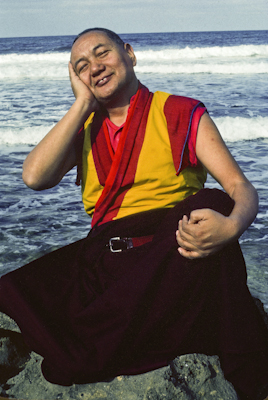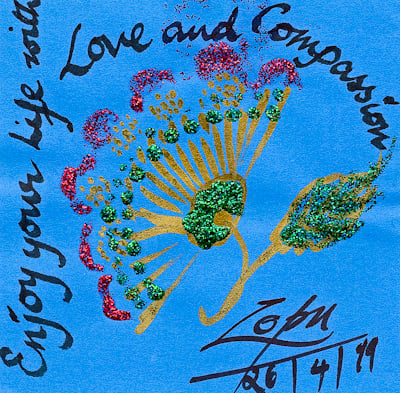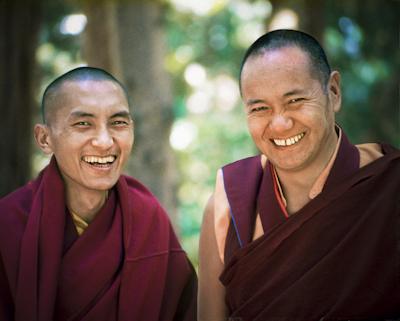Dear LYWA friends and supporters,
Thank you for your interest in LYWA. We appreciate that and your support of our work. No way we could do this without you. Thank you so much.
Our new book is here!  Lama Zopa Rinpoche's How to Practice Dharma: Teachings on the Eight Worldly Dharmas has arrived and we are in the process of sending it out to all our Members and major supporters of this project. You can read excerpts from this book here.
Lama Zopa Rinpoche's How to Practice Dharma: Teachings on the Eight Worldly Dharmas has arrived and we are in the process of sending it out to all our Members and major supporters of this project. You can read excerpts from this book here.
The book is available to order on our website for $10. It has also been published on Amazon for Kindle for $5.
This is the second book in our FPMT Lineage Series, a series of books of Lama Zopa Rinpoche’s teachings on the graduated path to enlightenment (lamrim). They are drawn from four decades of Rinpoche's discourses on the topic based on his own textbook, The Wish-fulfilling Golden Sun, and several traditional lamrim texts.
This series is the most extensive contemporary commentary on the path to enlightenment teachings available and comprises the essence of the FPMT's education program. The first in this series was Rinpoche's fabulous Heart of the Path.
We are now actively working on the next two books in the series, Rinpoche’s teachings on the perfect human rebirth, and impermanence and death. Please see our Membership page to join as Member and have all our Lama Yeshe and Lama Zopa Rinpoche books (as well as those published by Wisdom Publications) sent to you free upon publication.
New Teachings on our Website
Read excerpts from Lama Zopa Rinpoche's teachings at the 19th Kopan Meditation Course in 1986. Excerpts include teachings on:
-
How to Cherish Others and Be Happy
You can also read the entire set of Rinpoche's teachings from this course online, or download them as a pdf file, on our website here.
We have also posted teachings from a Lamrim Weekend Course given by Rinpoche in Adelaide Australia in August 1991. In this series Rinpoche covers the topics of making life meaningful, inherent existence and renouncing desire.
Read also a teaching from Australia in 1991 on The Nature of the Mind and a teaching from Singapore in 1988 on The Benefits of Dharma Practice, which is excerpted below as this month's eletter teaching.
New Audio and Video
 Listen online to excellent recordings of Rinpoche giving teachings on Chenrezig and compassion, from Madrid, Spain in June 2009. The recordings start off the Rinpoche chanting Shakyamuni Buddha's name mantra and Om Mani Padme Hum. A question and answer session at the end of the teaching is also included.
Listen online to excellent recordings of Rinpoche giving teachings on Chenrezig and compassion, from Madrid, Spain in June 2009. The recordings start off the Rinpoche chanting Shakyamuni Buddha's name mantra and Om Mani Padme Hum. A question and answer session at the end of the teaching is also included.
And in case you missed the announcement in our eletter last month, we have created a new LYWA YouTube channel, LamaYesheWisdom, where you can see for the first time, never released on DVD or video, Lama Yeshe’s wonderful Christmas Teaching, 25 December 1982, at Istituto Lama Tzong Khapa. Be sure to check out this new video, and subscribe to our new YouTube channel to be notified as we add new videos.
New Advice from Lama Zopa Rinpoche
We have again added many new advices to Rinpoche's Online Advice book this month:
- Advice on filling a stupa;
- Extensive advice on the antidote to lung;
- A long letter to a nurse who is working with the dying;
- An inspiring letter on the benefits of writing the Prajnaparamita;
... and many others. See all the new advices added to the Online Advice Book this month.
Remember, Lama Zopa Rinpoche’s official homepage on the FPMT website is also a wonderful resource for more information and lots of helpful advice.
More Good Finds on the Web
A new book has just been published titled Inner Peace—Global Impact: Tibetan Buddhism, Leadership and Work. The book explores how Tibetan Buddhism wisdom can inform successful leadership in the twenty-first century. I was asked to contribute a chapter on the history and development of the FPMT. You can see the contents and other contributors here. Please check it out.
Also, our friends at Vajra TV are now producing very nice incense candles. They offer light and scent at the same time! Get them for your personal use or contact them for wholesale rates.
This month we leave you with a teaching Rinpoche gave in Singapore in 1988. Thank you so much for your interest in and support of the Archive. We couldn’t do it without you.
Much love, 
Nick Ribush
Director
This Month's Teaching: The Benefits of Dharma Practice
 We are responsible for the welfare of each sentient being. We are completely responsible for enabling other sentient beings to obtain happiness and for pacifying their sufferings.
We are responsible for the welfare of each sentient being. We are completely responsible for enabling other sentient beings to obtain happiness and for pacifying their sufferings.
First, let's use ourselves as examples. While none of us want others to have anger towards us, we do want everyone to treat us with loving kindness and compassion. We wish that no-one would harm us, and that everyone would only help and benefit us. This is what we all want. This is the attitude and the action that we want others to have towards us. How can we bring this about? How can we make it happen?
This is using ourselves as examples. Likewise, every other sentient being—everyone whose mental continuum is separate from ours—wants us to have exactly the same feelings towards him or her. Other sentient beings do not want us to be angry with them; they want us to treat them with loving kindness and compassion. They do not want us to harm them, but would rather our actions benefit them. They would like us to be this way. They are depending on us to be kind and to help them. Therefore, it is very clear that we are responsible for bringing happiness to every other sentient being and for pacifying his/her sufferings. This is completely our responsibility. It is on our shoulders.
It is very important to be aware of this in everyday life. Even if other sentient beings do not practice Dharma and do not change their attitudes, it doesn't matter. Starting with our family, with however many members it has—one, five or ten—even if they do not practice Dharma and do not change their actions towards us, leave it at that. Even if all other sentient beings do not practice Dharma and do not change their attitude; even if all of them are angry with us, harm us, never have compassion for us or benefit us, even if they all criticize us and there is no sentient being who respects us, that is not really very harmful. We are only one person, so it is not very important.
PREVENTING GREAT HARM
If we ourselves, one person, do not change our attitudes and our actions, there is danger to all other sentient beings. If all others harm us, it is no big deal, because we are only one person, so there is only one person receiving harm. But if we do not change our attitudes and actions, then there is danger to countless others. We cannot count the number of other sentient beings who are endangered by our harmful attitudes and actions. Therefore, we can see how unbelievably important it is for us, one person, to practice Dharma, to subdue our negative mind and to develop love and compassion.
We can see this in history. When one person does not practice controlling his/her anger; when one person does not control his/her mind and does not practice patience, loving kindness and compassion, many millions of people have been killed. This is just talking about human beings, without counting the creatures in the oceans, in the forests and elsewhere that were killed as the result of this one person's actions. If one person does not practice Dharma and does not control his/her mind, the number of other sentient beings that are endangered is unbelievable. We can just look at the history of our world to verify this.
Right now, we have this perfect human body that gives us all the opportunities to practice the Dharma, and we have met the teachings. We have not just met the Buddhadharma, but we have come in contact with the Mahayana teachings which are even more rare and precious. The Mahayana teachings give so many answers; they contain so many solutions and methods to develop the mind. They are very profound and expansive. From the side of Buddha's teachings, they do not cheat us and there is nothing misleading or erroneous. If we practice them, definitely our mental defilements and stains will cease, and the continuum of our present mind will become omniscient. These teachings definitely lead to enlightenment.
While we have this perfect human body which gives us all the opportunities to practice Dharma, if we do not do it, then it could be dangerous. Each of us, if not in this life, then in future ones, could harm others just as certain people have done previously in history. We could even destroy the world.
Look at just this lifetime, from the time we were born until now. Because we have not practiced the good heart, because we have not developed the method to be harmonious with others, we have gotten angry and have harmed others. How many times have we been under the control of disturbing thoughts and hurt others through actions of our body, speech and mind?
Think of the beginningless rebirths we have taken in cyclic existence until now. Because we have not ceased the disturbing thoughts, anger, and the self-cherishing mind, there is not one sentient being whom we have not harmed in the past. In fact, we have brought harm to each and every sentient being numberless times while we have wandered in the cycle of samsara. We cannot even count how many times we have harmed just one sentient being since beginningless time. If we do not change this attitude—if we do not practice Dharma and transform our attitudes and actions, the danger of us harming others in the future is great. The actions of one person, me, can affect countless others. This is very serious.
In this way, we can see how important it is to change our attitude and how completely wrong it is not to try to do so. What is the use of us following the self-cherishing thought, anger and so forth, and yet expecting others to practice and to change their attitudes and actions? We then think, "They don't change, so why should I? They don't practice Dharma, they don't practice patience, so why should I?" This way of thinking is completely useless and it is a wrong way of thinking. It is like saying, "They are eating poison, so I will too." Then you do just as they do. Just this is reason enough to practice patience in our daily lives.
When we remember our responsibility towards every sentient being—to pacify their sufferings and bring about their happiness, then there is no time to be angry. There is no time, no opportunity to harm them.
Think about all the benefits of practicing Dharma. Take a couple, for example. If one of them practices Dharma, it is so beneficial. If one person—either the husband or the wife—practices Dharma, develops compassion and loving kindness, then that one person's mind is tranquil. Even if the other person does not change at all, because one person practices the whole situation is better. If the husband practices, then his own mind is happy, so when the wife is angry and tries to harm him, he does not retaliate. He does not get angry at her, therefore, she is happier, because she does not receive harm from him. That gives her more peace. If the husband retaliates, then she not only has the problem of her original anger, but she also receive harm. In addition, she has more problems, because she gets angry and creates more negative karma with body, speech and mind. The situation continues, getting worse and worse.
However, if the husband practices patience, then she will experience peace. That peace depends on the husband's attitude and actions that came from him. She and others around her receive less harm and have more peace. Of course, if both people practice, there is no question of the result and the great benefit that comes.
Here, we are talking about only one couple. If there is a family with five or ten people, and one of them practices Dharma, and controls his/her mind, then, even if the other nine do not practice, at least they do not receive harm. The harm received by the other nine members becomes less, and the harm they receive from one person stops because she is practicing. The other nine members of the family have peace. You can see that the happiness and peace of nine people completely depend on that one person. If she did not practice, then there would be additional problems, but because he or she practices, the other nine have fewer problems.
If one person practices bodhicitta, then an uncountable number of other sentient beings do not receive harm from one person. They have more peace. It is similar to the family, only more beings are involved . As we practice Dharma and control our mind, the harm received by all other sentient beings becomes less. They receive that much more peace. That peace that they experience is dependent on us; it comes from us. Now you can see how each of us is completely responsible for every sentient being’s happiness and for the pacification of his/her suffering.
You can see why Dharma practice is so important. Practicing Dharma means subduing the mind, controlling the disturbing thoughts. When an action or thought becomes the remedy to a disturbing thought or harmful action then that is the Dharma. This relates specifically to our daily lives, for example, if we look at other people with respect and loving kindness; if we smile at them with a good heart and compassion, it makes them happy and they appreciate our attitude and our action. Even just smiling makes other sentient beings happy.
When we sincerely respect others, and show it by means of our body, speech and mind, they are happy. Remember how sentient beings are the source of all of our happiness and our attainments. They are so precious and kind—their kindness towards us is immeasurable. If we remember this, then we can respect other sentient beings just as we respect the Buddha and the Sangha. When we sincerely show respect to others from our heart, this makes them happy and joyful.
From these simple examples, we can see how we can bring others happiness. Every day we are involved with so many people—in the family, at work and in the streets. If we have good manners and respect, and appreciate their kindness, it makes them happy. Their happiness depends upon us. You can see from examples in daily life how our positive attitude affects them. How we act and behave with them makes a difference in their lives, and in this way, you can see how other sentient beings' happiness completely depends on us. We are responsible.
Thus, it is unbelievably important to practice and develop bodhicitta. If there is the good heart, an attitude of compassion and loving kindness, then our actions become helpful and beneficial. Others receive happiness as a result of our good heart. The ultimate good heart is bodhicitta. The more we develop a good heart, the more extensive is the benefit received by other sentient beings. As we develop our capacity, our potential and wisdom, then we are able to offer more and more extensive benefit to others. The benefit we can give expands all the way up to enlightenment.
Lama Zopa Rinpoche gave this talk in Singapore in June, 1988. Edited by Thubten Chodron. You can read the rest of it here.































